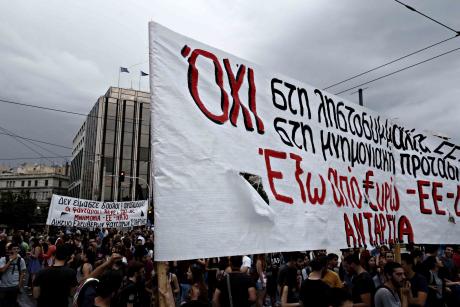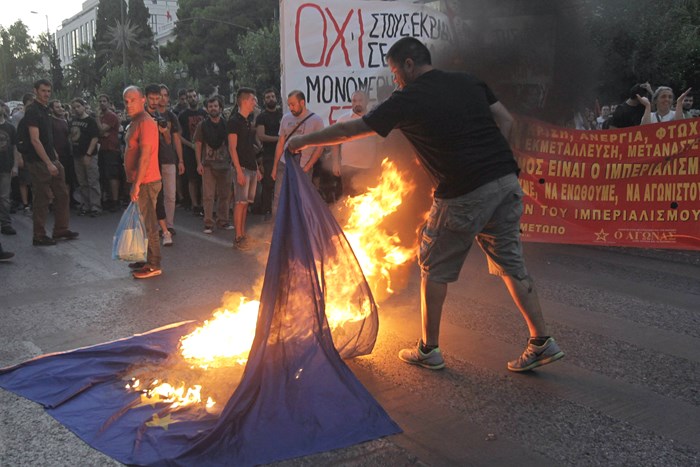Em sua essência, a questão de domingo é uma de dignidade e sobre nossas vidas a partir desse momento.
Por Antonis Vradis

O plebiscito de domingo não é sobre um detalhe fiscal ou outro, um acordo ruim ou outro menos pior. Na sua essência, a questão de domingo é sobre dignidade e sobre nossas vidas a partir desse momento.
É sobre a dignidade para acabar com as gangues de colarinho branco que fizeram com que a até então desprezível face do poder político parecesse bem intencionado e inocente. E é sobre uma questão de saber se nós (enquanto indivíduos, não essa ideia estranha de “povo”: mais sobre isso daqui a um momento) queremos continuar vivendo uma vida de incertezas excruciantes, ultimatos e emergências intermináveis, de humilhação e tristeza.
É uma questão que aqueles entre nós sortudos os suficientes para chegarem nas urnas terão que responder por aqueles que não conseguiram chegar. É por isso que eu, se o plebiscito for adiante, vou votar pela primeira vez na minha vida. Eu vou votar pelos meus amigos e familiares afugentados e a que foi negada a capacidade de viver aqui. Eu vou votar por um amigo querido que decidiu, nas horas mais escuras da crise, que a sua vida não valia ser vivida. Vou votar na esperança que assim ajudarei a fazer com que as vidas da gangue do mercado se tornem verdadeiramente inviáveis.
Como um anarquista, não tenho nenhuma fé no sistema de representação eleitoral, nem tenho vontade de entregar minhas demandas políticas para qualquer líder, por qualquer período de tempo. Mas isso não é o que esse plebiscito irá fazer. Seja ele um plano bem orquestrado pelo Syriza para fazer as pessoas engolirem o remédio da austeridade, o seu blefe já foi lançado. Com certeza, o voto “não” no domingo não irá garantir que mais um outro programa de austeridade não se siga a esse. Mas nós iremos lidar com isso se e quando tal programa chegar. E com certeza, ao votar “não” nós não temos nenhuma ideia para o que nós estamos votando “sim”.
Mas eu tenho uma ideia bem clara para quem o meu “não” se dirige. Esse “não” vai para o mercado, essa força onipresente que nós permitimos permear mesmo os nossos espaços mais íntimos, mesmo os mais internos, as fundações basilares de nossa existência. Vai para a escória parasitária em ternos e gravatas, os padres da ortodoxia bancária e sua pomposa e arrogante crença de que eles podem se manter comandando o show para sempre.
Não, vocês não podem. O voto vai para aqueles que estão alimentando o nacionalismo na Europa, vai contra a invocação do Syriza de um “povo” grego. Existe tal coisa como o “povo”? Claro que não; eu não tenho nenhuma ideia do que essa ideia significa. Onde se encontra qualquer comunalidade? Na língua que nós falamos? Nos espaços que nós habitamos? Nossos interesses são de alguma forma compatíveis, ou ao menos comuns, com a escória parasitária sugando o sangue para fora de nossas próprias vidas?
A esquerda nesses cantos, e no continente como um todo, será historicamente responsável por colocar essa ideia para frente, por alimentar nacionalismos, por ajudar a formar um ambiente onde em que a mais a mais desprezível das ideologias da extrema-direita pode prosperar. Nossas comunalidades não estão na língua, nossos laços não dependem de nossas proximidades físicas.
Há não muito tempo atrás nós conseguimos desenvolver um movimento anti-capitalista nesse continente baseado na seguinte compreensão: nós estamos no caminho de criar uma consciência política da Europa como um espaço comum. Esse “não” é uma homenagem ao nosso legado comum anti-capitalista e anti-autoritário, legado este que foi esmagado nesse cenário de emergência permanente e governo mercantil.
Agora é quando nós começamos a reimaginar nossas comunalidades e interesses trans-fronteiriços, agora é quando nós expomos nossos inimigos dentro e fora das fronteiras por aquilo que são, agora é quando nós trazemos para baixo a fachada do mercado e da unidade nacional. E tudo começa com esse “não”.

Texto originalmente publicado em inglês no portal Open Democracy e repassado pelo ativista Antonis Vradis para tradução e publicação na Rede de Informações Anarquistas.
Versão em inglês:
Sunday’s referendum vote is not about one fiscal detail or another, a bad agreement or one that is less so. In its essence, Sunday’s question is about dignity and our lives from this point on.
It is about the dignity to do away with the criminal gang-in-suits that has made even the otherwise despicable face of political power appear well-intended and innocent. And it is a question of whether we (as individuals, not as this weird idea of “a people”: more on this in a second) want to continue living a life of excruciating uncertainty, never-ending ultimatums and emergencies, of humiliation and sorrow.
It is a question those of us lucky enough to have made it to the ballot box will have to answer for those who didn’t make it. This is why, should the referendum go ahead, I will be casting a vote, for the first time in my life. I will be voting for my friends and family chased away and denied the capacity to live over here. I will be voting for my dear friend who decided, in the darkest hours of the crisis, that his was a life not worth living. I will be voting in the hope that doing so will help make the lives of the criminal market gang truly unlivable.
As an anarchist, I have no faith in the system of electoral representation, nor do I have the will to surrender my political demands to any leader, for any amount of time. But this is not what this referendum will do. Should this be a well-orchestrated plan on the side of Syriza to let people swallow the austerity medicine, their bluff is already called. Sure enough, a ‘no’ vote on Sunday doesn’t guarantee that yet another austerity programme won’t follow. But we’ll deal with that if and when it comes. And sure, in voting ‘no’ we have no idea what we are actually voting ‘yes’ to.
But I have a pretty good idea who my ‘no’ will go out to. This ‘no’ will go out to the market, this ubiquitous force we have allowed to permeate even the most intimate of our spaces, even the innermost, the core foundations of our existence. It will go out to the parasite scum in suits and ties, the priests of the banking orthodoxy and their pompous, arrogant belief that they can keep running the show, for ever.
No, you can’t. It will go out to those fueling nationalism in Europe, it will go out against Syriza’s invocation of a Greek “people”. Is there such a thing as a “people”? Of course not; I am not sure what the idea even means. Where does any such commonality lie? Is it in the language that we speak? In the spaces that we inhabit? Are our interests in any way compatible, let alone common, with the parasitic scum sucking the blood out of our very lives?
The Left on these shores, and in the continent as a whole, will be historically liable for putting this idea forward, for fueling nationalisms, for helping form an environment in which the most despicable of far-right ideologies can thrive. Our commonalities do not lie in language, our bonds do not depend upon our physical proximities.
Not too many years ago, we succeeded in developing an anti-capitalist movement on this continent based on this understanding: we were on course in creating a political consciousness of Europe as a common space. This ‘no’ is a homage to our common anti-capitalist, anti-authoritarian legacy, one that was crushed in this landscape of permanent emergency and market rule.
This is when we start re-imagining our cross-border commonalities and interests, this is when we expose our enemies within and beyond borders for what they are, this is when we bring down the facade of the market and national unity. And it all starts with this ‘no’.
